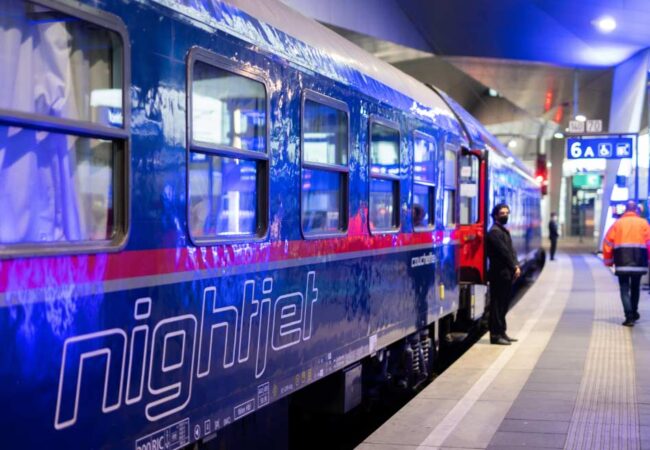Berlin (dpa) – Fall asleep in Berlin, wake up in Paris and save on carbon emissions at the same time: For the first time in almost a decade, the German, French and Belgian capitals are once again linked by sleeper trains.

On Tuesday morning, passengers woke up in Paris and Brussels in the first night train from Berlin run by Austrian Federal Railways (ÖBB) and aimed at offering a comfortable and climate-conscious alternative to short-distance flights.
One half of the train leaving Berlin travels to Brussels, the other to Paris. Passengers headed for Paris will arrive at the central Gare de l’Est station.
A cooperation between several railway companies, ÖBB’s night train is a collaboration with Deutsche Bahn, the French state railway SNCF and the Belgian NMBS/SNCB, with the so-called Nightjet trains come from the Austrian group.
Staffed and marketed by all participating railway companies, the night train now runs three times a week between Berlin, Paris and Brussels. The connection is even set to run daily from October 2024.
Busy, pricey and a bit hard to book
«The new night train connections are very well booked over the holidays,» the German railway said. Only after the holidays will there be «sufficient free capacity.»
«Basically, as soon as we launch a new night train connection together with our partner railroads, there is a real boom in bookings,» Deutsche Bahn said.
After discontinuing its night train service in Germany in 2014, more and more other companies have been filling the gap left by Deutsche Bahn.
The Dutch European Sleeper launched a connection between Berlin and Amsterdam this year. The Swedish railway company SJ has been offering a night train between Hamburg and Stockholm since the spring.
Interest in night trains has been booming in Europe in the last couple of years, especially as travellers show growing concern about climate change and high emissions from air travel.
Together with several European partner railroads, Deutsche Bahn is once again increasingly offering connections with the goal to connect 13 European cities with over a million inhabitants by night train.
Despite a would-be rebirth of night trains across Europe, the booking process is still rather complicated, infrastructure specialist and railway advocate Carl Wassmuth told Berlin broadcaster RBB.
«The booking platforms for night trains in Europe are a disaster, we are nowhere near where we need to be,» Wassmuth told RBB. «We need a standardised booking platform for all night trains so that I don’t have to train myself to find out where I can book this night train.»
Wassmuth called for a cross-European booking platform in a joint initiative between the countries in Europe to replace the hotchpotch of different national booking platforms.
€165 for a bed
One dampener for fans of the new night train between Berlin and Paris is probably the relatively high prices. The cheapest offer for a journey at the beginning of January currently costs just under €45 per person, albeit for a seat including reservation in second class.
In the couchette carriages, prices range from just under €100 per couchette seat in a compartment of six to more than €600 for a private couchette compartment.
A bed in a a sleeper carriage costs between €165 (for a journey in a compartment with three beds) and €475 for a one-person compartment with a bed. This is likely to be too expensive, and not just for many families.
«It’s certainly not a bargain, it’s not for people who want to travel extremely cheaply,» says Detlef Neuss from the German railway advocacy association Pro Bahn. The offer is primarily aimed at business travellers, he believes.
«The price is not the main focus, but rather comfort and relaxed travelling.» Nonetheless, the new connection is a step in the right direction, Neuss believes, even if it can’t yet compete with the prices of air travel.
By Matthias Arnold, dpa

